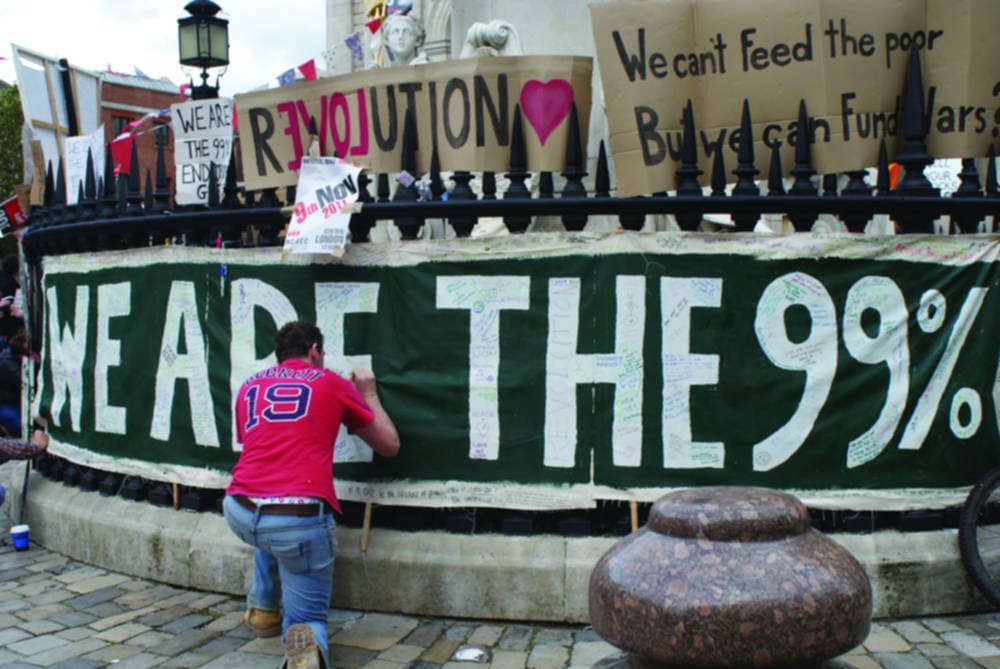Gazing into the soul of the 99%
A report on the ongoing London protests, by Luke Seldon

Saturday saw a global day of occupation and protest in 951 cities across 82 countries, making this day one of the most widespread days of resistance ever seen. Apart from Rome, they were also entirely peaceful. This was no random event but part of a global tide of uprising that began in the Arab spring and has swept across Europe and America. Although you may question the link between the protests in the Middle East and apparent Western democracies two common features have ran through them all: high unemployment combined with increasing difficulty to live on low wages and a feeling that the general public have no control over their governance.
These two themes were the main constituents of a manifesto published ahead of the actions on Saturday that aimed to voice the reasons behind these protests. In a style true to the movement the manifesto was produced over four months in consultation with the people involved in the movements in Britain, Egypt, Tunisia, Germany, Spain, the USA, Israel & The Palestinian Territories, Brazil, Mexico, Uruguay, Argentina, India and Australia. It highlighted how, whether it be Mubarak, the IMF, multinational banks or the G8/20, we are all dictated by a few people to whom we never gave permission. In the words of the Indian eco-feminist Vandana Shiva, we demand replacing the G8 with the whole of humanity – the G7 billion. The manifesto states that more than ever before our lives - including jobs, education, health and environment – are shaped by corporations, banks, markets and financial crises.
Although the manifesto attempts to accurately portray the global movement each country and region has taken particular emphasis on parts that are important to them. The Middle East is obviously focussed on dictatorships whilst Japan had a Fukushima element to the Tokyo occupation. Italy and Spain have emphasised political corruption and America and the UK tend to have centred on inequality. The most common of threads though is that we are born equal, and should be treated so.
Everyone has a say in small groups
In the largest UK demonstration – Occupy London Stock Exchange (still ongoing at time of writing) – has occupied the space outside St Paul’s Cathedral with up to 5000 people, after a high court injunction was imposed on the original target of the neighbouring and privately owned Paternoster Square. And not surprisingly inequality is a strong theme as inequality in the UK is only second to the US out of Western states. A banner displaying the slogan of Occupy Wall Street – we are the 99% - highlights how in the UK 1% of the population have accrued a third of the wealth.
Placards and conversations echoed this sentiment. A placard stated ‘I have no job but now I have an occupation’ which agreed with the feelings of a surprising number of young unemployed graduates I spoke to who feel they were sold a lie about education. After all that time and money they are left as part of the ever rising youth unemployment. One particular protester, educated to masters’ level, questioned our state’s derision of the poor and acceptance of the rich. “Currently I am living on £53 a week job seeker’s allowance to pay food, bills and other costs in London. This is barely enough to even survive but yet the law says this is how much you need to live on. However they have decided no maximum to live on, people receive million pound bonuses, where is the equality?”
This feeling of injustice is now evolving into an attempt to create a new democracy, one where everyone participates and decisions made at least have a chance of representing the majority of people. The whole protest in St Paul’s works as horizontally as possible. Everyone has a say in small groups with a spokesperson sent to give feedback to the whole occupation in what is called a general assembly. The common feeling is that this protest is there to stay; people are planning to camp or make return visits. The persistence and growth of this movement across the world is giving constant strength and support. Normally protests are dismissed in the few hours afterwards, the people ignored. However, by staging a permanent protest this becomes increasingly difficult and there’s a chance our voices may finally break through.
As one middle aged occupier described how the current way our society functions “constantly degrades” him, others mimicked the Zapatista’s of Mexico in declaring “Ya basta! (Enough!)”







